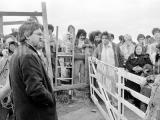Cyclone Bola
Cyclone Bola wreaked havoc when it struck the Hawke’s Bay and Gisborne–East Cape region in March. Some places received 900 mm of rain – nearly as much as Gisborne’s annual average – in 72 hours, with the Poverty Bay hill country especially hard-hit. The region’s hillside pastures were swept away by innumerable landslides. Thick sediment from the receding floods smothered pastures, orchards and crops ready for harvest. Local farmers and horticulturalists lost an estimated $90 million (equivalent to $170 million in 2013). Thousands had to evacuate their homes to escape floodwaters that swept away bridges, sections of road and railway lines. Three people died in a car lost in the flood. The cost to the government exceeded $110 million ($210 million).
Bastion Point land returned
Between January 1977 and May 1978 Bastion Point on Auckland’s Waitematā Harbour was the site of one of the most high-profile protest actions in New Zealand history. Protesters occupied the site after the government announced that land formerly reserved for Ngāti Whātua had been earmarked for an upmarket housing development. The size of the reserve had been gradually reduced by compulsory acquisition, leaving iwi holding less than 1 ha.
The matter was eventually taken to the Waitangi Tribunal, which recommended that Bastion Point be returned to Ngāti Whātua. In July 1988 the government announced that it had accepted this recommendation.
The State Sector Act
The State Sector Act 1988 was another crucial piece of legislation in the Labour government’s reform of the public sector. Since 1912 public servants had been employed by the Public Service Commission(er) (later the State Services Commission). Government departments were managed by permanent heads, which in 1988 were replaced by chief executives employed on fixed-term contracts. These resembled their private-sector counterparts and now employed all staff in their departments directly. The act removed the career security of public service employment, abolished compulsory industrial arbitration in the sector, and introduced labour relations law that had previously applied only in the private sector.
In 1984 the core public service employed just over 66,000 people. Fifteen years later the number had shrunk to 30,000.
Pausing for ‘a cuppa’
As the fall-out from the 1987 stock-market crash became evident, David Lange called for a pause in the roll-out of ‘Rogernomics’ by suggesting ‘a cuppa’. Minister of Finance Roger Douglas interpreted Labour’s victory in the 1987 election as an endorsement of his policies and wanted to press on. Douglas proposed the introduction of a flat income tax rate of 23% and an increase in GST to 12.5%. Cabinet approved the package, which was announced by Lange, Douglas and other senior ministers at a press conference on 17 December. But after reflecting over the holiday period, Lange announced in January 1988 that there would be no flat tax. This sparked a virtual civil war in Cabinet between Lange and Douglas and their respective supporters. Hostilities escalated when Lange announced a review of the asset-sale process. The minister responsible (and key Douglas ally), Richard Prebble, was sacked in November 1988, and described Lange as dictatorial and irrational. In December, Douglas informed Lange that he intended to tell the Labour caucus he could no longer serve in a government he led. Lange construed this letter as a resignation. On 21 December, Douglas mounted an unsuccessful challenge to Lange’s leadership in the Labour caucus.
Other 1988 events
- The Cartwright Report outlining the failure of National Women’s Hospital in Auckland to adequately treat dozens of cervical cancer patients was released to the public.
- New Zealand’s second America’s Cup challenge ended in defeat when Michael Fay’s big-budget big boat was defeated 2-0 by Dennis Conner’s Stars and Stripes catamaran.
- After illegally jumping from the Eiffel Tower, Paris in 1987, A.J. Hackett and his business partner Henry van Asch began the world’s first commercial bungy jump on the Kawarau River near Queenstown.
- The ‘Gibbs Report’ on ‘options for the reorganisation of the public hospital system’, Unshackling the hospitals, was released. The country’s 25 hospital boards are eventually replaced by 14 area health boards.
- The electrification of the North Island Main Trunk railway line was completed.
- Vincent Ward’s The navigator: a medieval odyssey screened at the Cannes Film Festival
- Dave Dobbyn cemented his place as ‘musician of the decade’ with Best Album and Best Male Vocalist at the annual Music Awards. The Holidaymakers won Single of the Year for ‘Sweet lovers’, while Shona Laing and Herbs retained their 1987 accolades with Best Female Vocalist and Best Group respectively.
Do you remember 1988? Add your memories and comments in the form below.








Community contributions